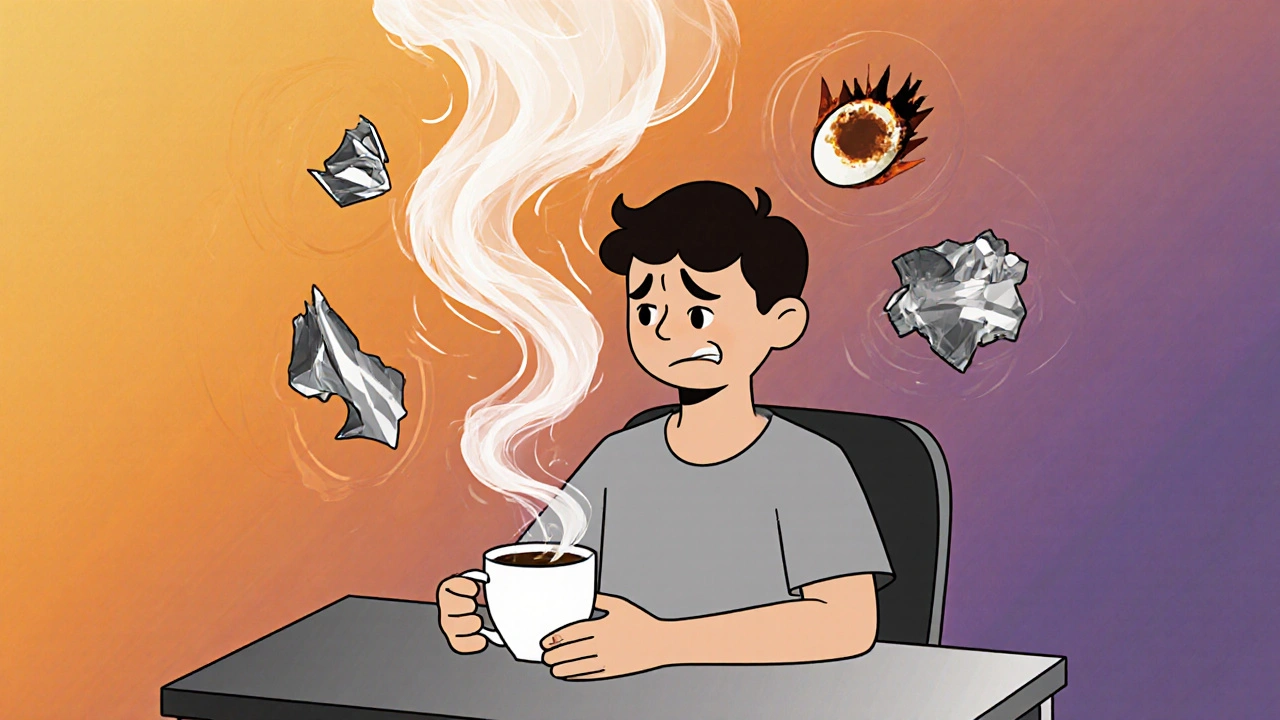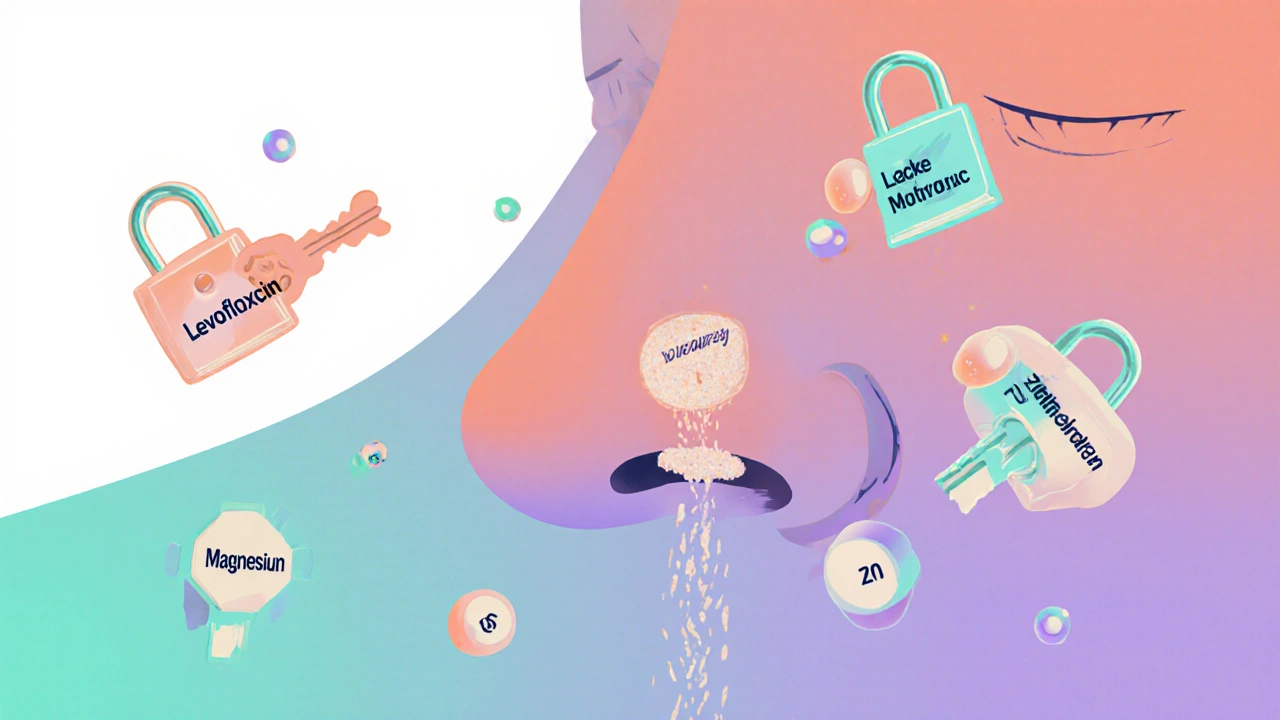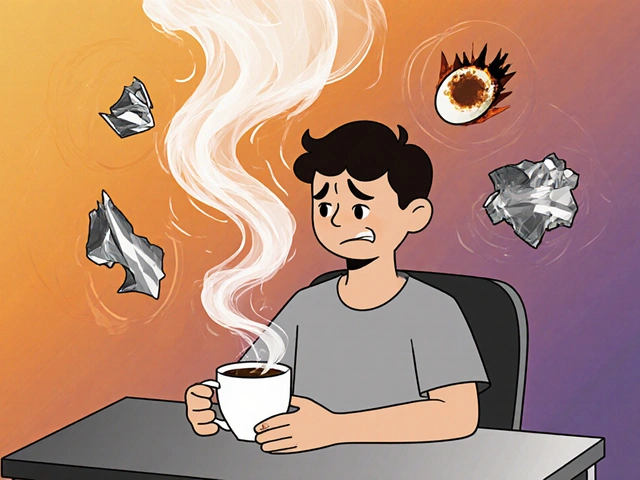Medications That Change Your Sense of Smell: What You Need to Know About Dysosmia

Dysosmia Medication Risk Checker
Medication Risk Assessment
This tool assesses your risk of developing dysosmia (abnormal smell/taste perception) based on medications you're taking. Select the medications you're currently using to see your risk level.
Select medications to see your risk assessment
Have you ever taken a medication and suddenly noticed that your favorite coffee tastes like metal, or that bread smells like rotten eggs? You’re not alone. Thousands of people experience strange, unpleasant, or even terrifying changes in their sense of smell and taste after starting a new drug. This isn’t just a weird quirk-it’s a real medical condition called dysosmia. And while it’s rarely discussed in doctor’s offices, it’s far more common than most people realize.
What Exactly Is Dysosmia?
Dysosmia is when your brain misreads smells. A familiar scent-like fresh grass, perfume, or cooked meat-might suddenly smell like garbage, smoke, or chemicals. Sometimes, you smell something that isn’t there at all. This isn’t a problem with your nose. It’s your brain interpreting signals wrong because a medication has disrupted the delicate system that processes smell. This isn’t just about comfort. When food tastes like poison, you stop eating. People lose weight. Some lose 10, 15, even 20 pounds in weeks. One woman on Reddit lost 15% of her body weight after taking azithromycin-food tasted like rotting eggs for over two years. That’s not an exaggeration. That’s a documented case.Which Medications Cause Smell Changes?
Over 500 medications have been linked to dysosmia. But not all are created equal. Some carry a much higher risk. Antibiotics are the biggest offenders. Fluoroquinolones like levofloxacin and moxifloxacin, and tetracyclines like doxycycline, are notorious. Macrolides like azithromycin and clarithromycin are also high-risk. These drugs interfere with zinc and magnesium levels in your nose, which are essential for smell receptor function. In some cases, symptoms start within days of starting the drug. Heart medications like midodrine can also trigger it. You might not expect a blood pressure pill to make your toast smell like burnt plastic, but it can. Neurological drugs like carbamazepine (used for seizures and nerve pain) are especially dangerous. Some patients report complete loss of taste along with smell distortion. In rare cases, the damage doesn’t go away-even after stopping the drug. Even IV drugs like lidocaine or iron infusions can cause a metallic taste within minutes. It’s fast, intense, and usually temporary-but still terrifying if you don’t know why it’s happening.Why Does This Happen?
Your sense of smell relies on tiny receptors in your nose that send signals to your brain. These receptors are like locks, and smell molecules are the keys. Medications can mess with this system in several ways:- They block the lock so the key can’t turn (receptor inhibition)
- They jam the lock so it stays open even when no key is there (abnormal persistence)
- They interfere with the chemicals that shut off the signal (GPCR kinases, TRPM5 channels)
- They drain minerals like zinc and magnesium that your smell cells need to repair themselves

How Common Is This?
Most doctors don’t ask about smell changes. A 2022 survey found only 37% of primary care doctors routinely check for them. But experts say up to 20% of all smell and taste disorders come from medications. That’s one in five people with a persistent smell problem-likely because of a pill they took. In one study, 78% of patients saw improvement within three months of stopping the offending drug. But 22% didn’t get better on their own. That’s why ignoring it can be dangerous.What Should You Do If This Happens?
First, don’t panic. But also don’t ignore it.- Track the timing. Did the smell change start within a week or two of starting a new medication? That’s a strong clue.
- Don’t stop your meds without talking to your doctor. Some drugs, like antibiotics or blood pressure pills, can’t be stopped suddenly.
- Ask about alternatives. If you’re on levofloxacin for a mild infection, is there another antibiotic that doesn’t carry this risk?
- Get tested. The University of Pennsylvania Smell Identification Test (UPSIT) is a simple 40-item test that can confirm if your smell function is impaired. It’s used in clinics across the UK and US.
Can It Be Treated?
There’s no magic pill. But some approaches help.- Stopping the drug. This is the most effective step-when possible.
- Zinc supplements. Some patients benefit, but only if they’re actually deficient. Taking zinc blindly can cause copper deficiency. Don’t self-prescribe.
- Theophylline. This asthma drug has been used off-label to restore smell function by helping receptors reset. It’s not FDA-approved for this, but doctors sometimes try it.
- Mirtazapine. One case study showed this antidepressant fixed metallic taste in just five days. It’s being studied for broader use.

What If It Doesn’t Go Away?
For some, the smell changes linger. That’s when support matters. Organizations like Fifth Sense in the UK run monthly virtual support groups for people dealing with long-term smell loss. Over 150 people join each session. They share tips: using strong mint or citrus to reset your nose, avoiding cooking smells by eating cold meals, using smoke detectors more often because you can’t smell gas. It’s not just about food. Not being able to smell smoke, spoiled milk, or a gas leak is dangerous. People have been hospitalized because they didn’t realize their oven was leaking.Why Isn’t This More Widely Known?
Because it’s not tracked. Unlike rashes or nausea, smell changes aren’t mandatory to report in most countries. Drug companies don’t test for them in clinical trials. The FDA only started encouraging companies to measure taste and smell as side effects in 2021. And even now, most electronic health records don’t have a checkbox for “changed sense of smell.” That’s changing. The European Medicines Agency plans to require smell and taste assessments in all new antibiotic and heart drug trials starting in 2024. The NIH just funded $4.7 million in research on this exact issue.What’s Next?
If you’re on a medication and your sense of smell changed, you’re not imagining it. You’re not crazy. You’re part of a growing group of people who are finally being heard. Talk to your doctor. Ask: “Could this drug be affecting my smell?” Bring a list of your meds. If they don’t know, ask for a referral to an ear, nose, and throat specialist who deals with smell disorders. And if you’re one of the many who’ve lived with this for months or years-know that you’re not alone. Research is moving fast. Treatments are coming. And your voice matters.Can antibiotics cause permanent smell loss?
In most cases, no. About 78% of people recover their sense of smell within three months after stopping the antibiotic. But for about 22%, the damage can persist. This is more likely with fluoroquinolones like levofloxacin and moxifloxacin, which interfere with zinc levels needed for smell cell repair. Permanent loss is rare but possible, especially if the drug was taken for a long time or if the person already had a weakened sense of smell.
Is zinc supplementation helpful for medication-induced dysosmia?
It can help-but only if you’re actually deficient. Zinc plays a key role in smell cell regeneration, and some antibiotics deplete it. However, taking zinc without a blood test can cause copper deficiency, which may worsen neurological symptoms. Always get tested before starting supplements. Don’t self-treat based on internet advice.
Why do some people smell smoke when there’s none around?
This is a type of dysosmia called phantosmia-smelling something that isn’t there. It happens when medications disrupt the brain’s signal processing. Instead of receiving normal odor signals, the brain generates false ones. This is common with neurological drugs like carbamazepine and antibiotics like azithromycin. The brain misfires, and the most common phantom smell reported is cigarette smoke, even in nonsmokers.
Can I get tested for smell loss at my GP’s office?
Most GP offices don’t have the tools. But your GP can refer you to an ENT specialist who uses the University of Pennsylvania Smell Identification Test (UPSIT). It’s a simple 40-scent scratch-and-sniff test that takes about 15 minutes. It’s the gold standard for diagnosing smell disorders. If you’re on a high-risk medication and notice changes, ask for this test.
Are there any new treatments being developed?
Yes. Clinical trials are testing drugs that target TRPM5 channels-specifically the mechanism disrupted by antibiotics. These are the first treatments designed to reverse medication-induced dysosmia, not just manage symptoms. AstraZeneca has even patented a compound for this. The European Medicines Agency will require smell testing in new drug trials starting in 2024, which will accelerate progress.
How long does it usually take for smell to return after stopping the drug?
Most people notice improvement within 4 weeks, and 78% recover fully within 3 months. But recovery isn’t always linear. Some people get better in stages-first the metallic taste fades, then food smells normal again. Others experience fluctuating symptoms for months. Patience is key, but if there’s no change after 3 months, see a specialist.
Can dysosmia be confused with neurological problems like Parkinson’s?
Yes. Loss of smell is an early sign of Parkinson’s and Alzheimer’s. That’s why doctors must rule out neurological causes before blaming a medication. But the key difference is timing. If your smell changed within days or weeks of starting a new drug, it’s far more likely to be drug-induced. A detailed history and smell test can help distinguish between the two.
Should I avoid all antibiotics if I’m worried about smell changes?
No. Antibiotics save lives. But you should be informed. If you’re prescribed a fluoroquinolone or macrolide for a mild infection (like a sinus infection or bronchitis), ask if there’s a safer alternative. For serious infections, the risk of not treating is greater than the risk of smell changes. The goal isn’t to avoid antibiotics-it’s to choose the right one for your situation.


Nikhil Purohit
I took azithromycin last year and suddenly my pizza smelled like burnt tires. I thought I was going crazy. Turned out it was the drug. Took 8 months to recover. No one in my doctor’s office even asked. This post is a godsend.
Debanjan Banerjee
Let’s be clear: fluoroquinolones are neurotoxic. They chelate zinc and magnesium, disrupt TRPM5 channels, and induce oxidative stress in olfactory epithelium. The fact that this isn’t in every prescribing leaflet is a systemic failure. I’ve seen patients with permanent dysosmia after a single course. This needs regulatory action-not just awareness.
Michael Marrale
Wait… have you ever wondered if Big Pharma is hiding this? I mean, why don’t they test for smell changes in trials? Coincidence? Or are they letting people lose their sense of smell so they keep buying new meds? I’ve got a friend who smelled smoke for 3 years after a simple UTI antibiotic. Now he won’t even take ibuprofen. Something’s off.
David vaughan
I’ve had this since my last round of doxycycline… it’s been 11 months. I don’t even cook anymore. Everything smells like wet concrete. I tried zinc… nothing. Theophylline? I asked my doc… they looked at me like I asked for a unicorn. 😔 I just eat cold meals now. And cry a lot. But at least I’m not alone.
Chris Vere
This is why we need to listen to the body more than the pill bottle. The nose remembers before the mind does. Many ignore it because it is not visible. But loss of smell is loss of connection to the world. Not just food. Not just danger. But memory. Joy. Presence.
Pravin Manani
From a neuro-otology standpoint, the olfactory epithelium’s basal stem cells are exquisitely sensitive to pharmacologic disruption. Fluoroquinolones induce mitochondrial dysfunction via topoisomerase II inhibition, while macrolides alter GPCR kinase signaling cascades downstream of OR5AN1 receptors. Zinc supplementation only helps if serum levels are <70 µg/dL-otherwise, you risk copper deficiency-induced neuropathy. Always check MCV and ceruloplasmin before supplementing. Also, UPSIT is gold standard-don’t trust those online scratch-and-sniff apps.
Mark Kahn
You’re not broken. You’re not weird. You’re just one of the millions who got hit with a side effect no one talks about. I know it sucks. But you’re doing everything right by asking questions and seeking answers. Keep pushing your doc. Find an ENT who actually knows about smell disorders. And hey-you’ve already helped someone reading this. That counts. 💪
Leo Tamisch
Ah yes. The olfactory enlightenment. 🌿✨ How poetic that the very mechanism that lets us smell roses also lets us smell the rot of modern pharmacology. We live in an age where we can edit genes but can’t ask a pharmacist if your antibiotic makes your coffee taste like a landfill. The tragedy isn’t the dysosmia… it’s that we’ve normalized being chemically violated and calling it ‘side effect.’ 🤡